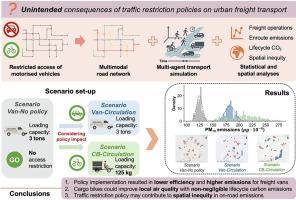市区以外:限制进入的政策是如何转移污染而不是消除污染的
IF 7.7
1区 工程技术
Q1 ENVIRONMENTAL STUDIES
Transportation Research Part D-transport and Environment
Pub Date : 2025-09-12
DOI:10.1016/j.trd.2025.104980
引用次数: 0
摘要
城市交通限制政策旨在减少拥堵和排放,但它们对货运的意外影响往往被忽视。本研究采用基于活动的出行需求模型,嵌入到基于代理的模拟中,以评估限制通行政策对货运运营、道路排放和生命周期碳排放的影响。调查结果显示,送货车面临更多的弯路和低效率,导致当地和全球排放量增加。虽然货运自行车减少了当地的空气污染物,但它们有限的效率和显著的颗粒物和碳排放抵消了它们的一些好处。至关重要的是,该政策将污染从城市中心转移到了周边地区,凸显了空气质量的空间不平等。这些结果强调了一个关键的权衡:当地空气质量的改善可能以增加二氧化碳排放为代价,从而加剧全球变暖对环境的更广泛危害。该研究提倡更全面、更注重公平的政策设计。本文章由计算机程序翻译,如有差异,请以英文原文为准。

Beyond downtown: How restricted access policies shift pollution rather than eliminate it
Urban traffic restriction policies aim to reduce congestion and emissions, yet their unintended effects on freight transport are often overlooked. This study employs activity-based travel demand modelling, embedded in an agent-based simulation, to evaluate the impact of a restricted access policy on freight operations, on-road emissions, and life-cycle carbon emissions. Findings reveal that delivery vans faced increased detours and inefficiencies, resulting in higher local and global emissions. While cargo bikes reduce local air pollutants, their limited efficiency and notable particulate and carbon emissions offset some of their benefits. Crucially, the policy shifted pollution from city centres to peripheral zones, highlighting spatial inequities in air quality. These results underscore a critical trade-off: improvements in local air quality may be achieved at the expense of increased emissions, contributing to the more widespread environmental harm of global warming. The study advocates for more holistic, equity-aware policy design.
求助全文
通过发布文献求助,成功后即可免费获取论文全文。
去求助
来源期刊
CiteScore
14.40
自引率
9.20%
发文量
314
审稿时长
39 days
期刊介绍:
Transportation Research Part D: Transport and Environment focuses on original research exploring the environmental impacts of transportation, policy responses to these impacts, and their implications for transportation system design, planning, and management. The journal comprehensively covers the interaction between transportation and the environment, ranging from local effects on specific geographical areas to global implications such as natural resource depletion and atmospheric pollution.
We welcome research papers across all transportation modes, including maritime, air, and land transportation, assessing their environmental impacts broadly. Papers addressing both mobile aspects and transportation infrastructure are considered. The journal prioritizes empirical findings and policy responses of regulatory, planning, technical, or fiscal nature. Articles are policy-driven, accessible, and applicable to readers from diverse disciplines, emphasizing relevance and practicality. We encourage interdisciplinary submissions and welcome contributions from economically developing and advanced countries alike, reflecting our international orientation.

 求助内容:
求助内容: 应助结果提醒方式:
应助结果提醒方式:


